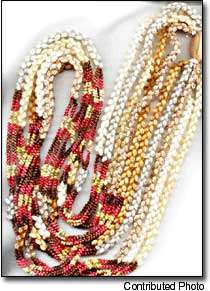In an effort to save the purity of the venerable Ni‘ihau shell lei, Kaua‘i resident Pam Ka‘ilikini Dow has taken her fight to the state Legislature. Dow, owner of Forever Kaua‘i & Waimea Canyon General Store in Kekaha, is one
In an effort to save the purity of the venerable Ni‘ihau shell lei, Kaua‘i resident Pam Ka‘ilikini Dow has taken her fight to the state Legislature.
Dow, owner of Forever Kaua‘i & Waimea Canyon General Store in Kekaha, is one of the strongest proponents of a law that would make it illegal to use the word “Ni‘ihau” on any lei that wasn’t at least 80 percent pure.
“This is a bill meant to protect, preserve and educate, not to punish,” Dow said.
If signed by the governor, hb 2569 would prohibit the sale of seashell items with descriptions or labels using the term “Ni‘ihau” unless the item contained 100 percent Ni‘ihau shells and was made entirely in Hawaii. Also, it would allow labeling indicating the percentage of Ni‘ihau shell content if the item contained at least 80 percent Ni‘ihau shells and was made entirely in the state.
Why all the fuss, you ask?
“They’ve been making these lei from pre-Western contact,” Dow said. “You know, they traded it and it was taken back to England. The people of Ni‘ihau have been working those lei consistently from that time until now.”
“We need to appreciate that,” Dow says. “Very few things culturally or artistically have survived that way. And the Robinsons have helped preserve that.”
The bill is now before the governor, and Dow is confident that a law will be on the books soon.
“I really believe she will sign it,” says a hopeful Dow. “She’s always been a person who’s supported Hawaiiana and Hawaiian culture.”
It’s good for business, too, Dow insists.
Dow believes the lei are worthy of the same protections as other Hawaii products, including Kona coffee. Ultimately, it would preserve the integrity of the product while protecting the customer from unscrupulous merchants who might not have much of a conscience when it comes to nefarious profit.
And there’s a lot of profit.
Indeed, a Ni‘ihau lei can net anywhere from $125 to $25,000. With that kind of money at stake, it’s not surprising that Dow has herself run across phoney Ni‘ihau lei, on Oahu and even here on Kaua‘i.
But she — unlike so many residents and tourists — can spot a fake Ni‘ihau lei miles away.
Dow is so good at authenticating Ni‘ihau lei that she and four other experts will be holding authentication workshops at Bishop Museum May 17 and 18, and at Native Books/Na Mea Hawaii at Ward Warehouse in Honolulu from May 19 to 23.
Dow admits that the goal of the workshop is to reinforce hb 2569.
Ni‘ihau shell are created and formed through erosive processes unique to Ni‘ihau, Dow said. The result are shells that never lose their luster, come in multiple varieties and colors and, when strung, are exquisitly beautiful.
And then there’s the craftsmanship, unmatched by anyshell lei makers anywhere, Dow says.
“Some lei design emulate the flowers of Hawaii: the pikake (Jasmine), lokelani (Hawaiian rose), heliconia and crown flowers,” she said. “Sometimes an artisan chooses to design a ‘piece de resistance’ that might span up to eight or 10 gathering seasons, each lasting just three to five months.”
While some insist Ni‘ihau shell wash up on the shores of Kauai, Dow says that they really can’t match the quality of those found on the “fobidden isle” itself.
“In the early ‘90s, as a guest of Ni‘ihau’s part-owner Keith Robinson, I had the priviledge of walking along some of Ni‘ihau’s pristine, glistening white shoreline,” she recalls.
“Friendly waves rolled across my path, leaving tiny seashells in place — gems from the sea. As I placed each shell in the palm of my hand, one shell at a time, I gained a consciousness and appreciation of the ocean’s gift to those chosen few inhabitants.”
Ultimately, says Dow, Ni‘ihau’s unique lifestyle has been a “preservation project of enormous magnitude,” helping to secure the lei artform that is today a high-quality gift to all of Hawaii Nei and the world.


